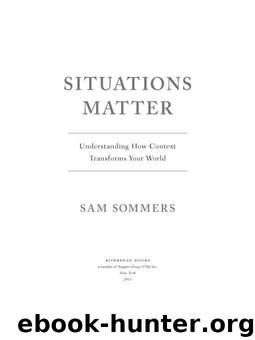Situations Matter: Understanding How Context Transforms Your World by Sommers Sam

Author:Sommers, Sam [Sommers, Sam]
Language: eng
Format: epub, mobi
Publisher: Riverhead Trade
Published: 2011-12-29T00:00:00+00:00
ARE YOU LOOKING to be a happier, more productive, more successful person? Are you in the market for self-help? Then stop worrying about how to see yourself for who you really, truly are. Forget about this “authentic” self business. Instead, learn to embrace the notion of the self as flexible.
Yes, your processes of self-perception are context-dependent. And introspection yields different information at different times. Your sense of self varies depending on who you’re with. Identity is malleable and personal preferences are constructed on the spot. But none of this is bad or distressing news.
So you’re not the person you thought you were, at least not all the time? Big deal. Let that conclusion empower not alarm you.
It’s refreshing to realize that you’re not a finished product—that who you are in the here and now may not be the same person you’ll be in the then and there. In fact, it’s that opposite view of the self as a fixed entity that causes problems. When you assume that there’s a true core self waiting to be discovered, that’s when your potential seems limited and the world around you is full of threats to be rationalized away.
Consider one study of college freshmen in Hong Kong.27 Researchers presented them with a series of statements regarding the stability of intelligence, including “you have a certain amount of intelligence and you really can’t do much to change it” and “you can learn new things, but you can’t really change your basic intelligence.” Based on students’ agreement or disagreement with these ideas, the researchers created two groups: those who saw their own intelligence as a predetermined, stable entity and those who thought of their own intellect in more malleable terms.
The freshmen were then asked whether they intended to enroll in a remedial English course in the years to come. Not surprisingly, those who had aced their high school English certification exam were less likely to plan on taking such a course than students who had scored in the C range or worse. But even among low-performing students, those who viewed intelligence level as etched in stone saw no need for remedial work. They were already as good as they were going to get at English, they figured. So why bother? Only the low performers with a less fixed view of their own intellect were willing to sign up for the additional English work that they really needed.
In other words, seeing the self as a static and stable entity is what puts us on the defensive and mandates chronic self-deception. Think of a characteristic like intelligence in terms of fixed capacity and the poor exam grade or subpar performance review becomes intolerably threatening. Instead, you should train yourself to view intellect—and any other aspect of your personal skill set—as a muscle that grows with effort and atrophies with neglect. When you accept that the answer to “Who am I?” should be written in pencil and not pen, threats become opportunities and failures transform into life lessons. Even if this isn’t how you usually see things, it’s not too late to start now.
Download
Situations Matter: Understanding How Context Transforms Your World by Sommers Sam.mobi
This site does not store any files on its server. We only index and link to content provided by other sites. Please contact the content providers to delete copyright contents if any and email us, we'll remove relevant links or contents immediately.
Rewire Your Anxious Brain by Catherine M. Pittman(18657)
Talking to Strangers by Malcolm Gladwell(13375)
The Art of Thinking Clearly by Rolf Dobelli(10490)
Mindhunter: Inside the FBI's Elite Serial Crime Unit by John E. Douglas & Mark Olshaker(9345)
Becoming Supernatural by Dr. Joe Dispenza(8223)
Change Your Questions, Change Your Life by Marilee Adams(7786)
Nudge - Improving Decisions about Health, Wealth, and Happiness by Thaler Sunstein(7711)
The Road Less Traveled by M. Scott Peck(7605)
The Lost Art of Listening by Michael P. Nichols(7507)
Mastermind: How to Think Like Sherlock Holmes by Maria Konnikova(7350)
Enlightenment Now: The Case for Reason, Science, Humanism, and Progress by Steven Pinker(7315)
Win Bigly by Scott Adams(7202)
The Way of Zen by Alan W. Watts(6619)
Daring Greatly by Brene Brown(6516)
Big Magic: Creative Living Beyond Fear by Elizabeth Gilbert(5778)
Grit by Angela Duckworth(5617)
Ego Is the Enemy by Ryan Holiday(5453)
Men In Love by Nancy Friday(5245)
The Laws of Human Nature by Robert Greene(5213)
